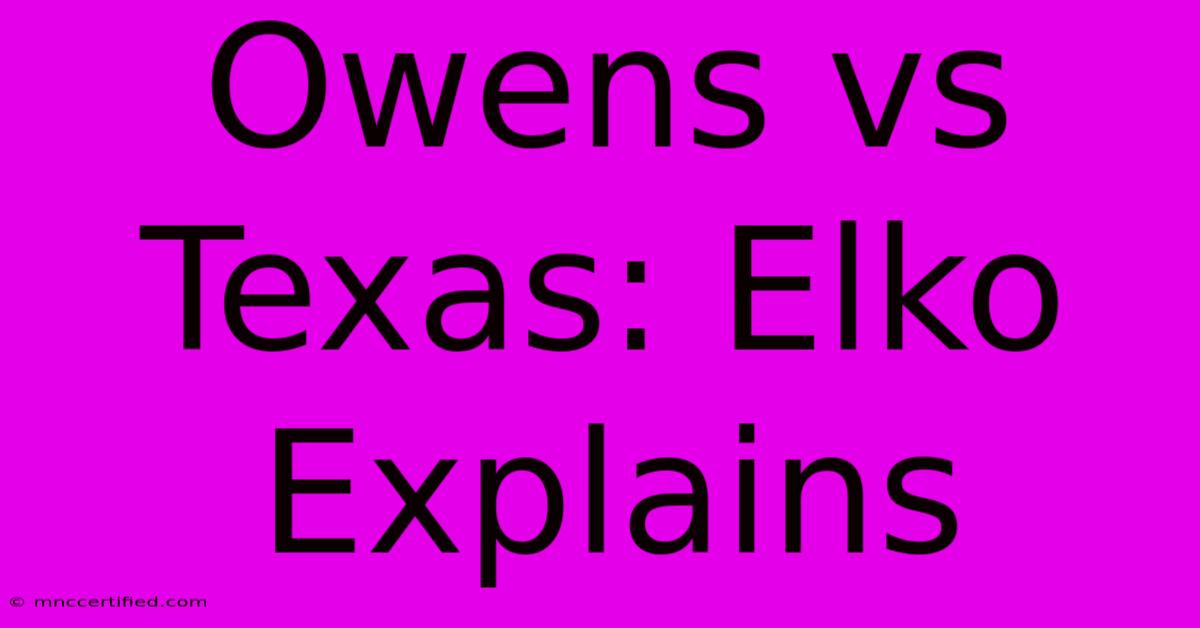Owens Vs Texas: Elko Explains

Table of Contents
Owens vs. Texas: Elko Explains the Key Issues
The landmark case of Owens v. Texas has sent ripples through the legal community, sparking intense debate about the intersection of criminal procedure, Miranda rights, and interrogation techniques. This article aims to provide a clear, concise explanation of the case, focusing on the key issues that make it so significant. We'll delve into the facts, the legal arguments, and the potential implications of the ruling, all explained in a way that’s accessible to a broad audience. Understanding Owens v. Texas requires a nuanced look at the complexities of police procedure and constitutional rights.
The Facts of the Case: A Summary
Owens v. Texas centered around the arrest and interrogation of Mr. Owens. The specifics of the crime are crucial, as are the methods employed by law enforcement. While the exact details may vary depending on the source, the core narrative remains consistent: Mr. Owens was a suspect in a serious crime. During the course of the investigation, he was questioned by Texas law enforcement. Crucially, the case hinges on whether his statements were made voluntarily, or if they were coerced or obtained in violation of his Fifth Amendment rights against self-incrimination, as protected through the Miranda rule.
Understanding the Miranda Rights: A Crucial Element
The Miranda rights, established in Miranda v. Arizona, require law enforcement officers to inform suspects of their constitutional rights before custodial interrogation. These rights include the right to remain silent, the right to an attorney, and the understanding that anything said can and will be used against them in court. The Owens v. Texas case directly grapples with the application and interpretation of these fundamental rights. Did the Texas officers properly inform Mr. Owens of his Miranda rights? Was the interrogation conducted in a way that preserved his right to remain silent? These are central questions the court had to address.
The Ambiguity of "Custodial Interrogation"
The definition of "custodial interrogation" itself is a source of significant legal debate. This case highlights the gray areas surrounding what constitutes custody and the point at which Miranda warnings become mandatory. Did the circumstances of Mr. Owens' interrogation meet the legal threshold for "custodial interrogation"? This nuance is critical in determining the admissibility of his statements as evidence.
The Legal Arguments and the Court's Decision
The legal arguments presented in Owens v. Texas likely involved a detailed examination of the facts surrounding the interrogation. The defense likely argued that Mr. Owens' statements were coerced, involuntary, and obtained in violation of his Miranda rights. The prosecution, conversely, argued that the interrogation was conducted lawfully, and that Mr. Owens' statements were made voluntarily and knowingly.
The court's final decision in Owens v. Texas will shape future interpretations of Miranda rights and custodial interrogation. Understanding the specific rationale behind the ruling is key to grasping its broader impact on the legal landscape. The decision likely involved a careful weighing of the evidence presented and a thorough analysis of existing precedents related to due process, self-incrimination, and the interpretation of Miranda warnings.
The Implications of Owens v. Texas
The outcome of Owens v. Texas carries significant weight. It will undoubtedly impact future cases involving similar circumstances, influencing how courts interpret and apply the Miranda rule. This case serves as a crucial reminder of the importance of constitutional rights and the need for law enforcement to adhere to proper procedures during investigations. The decision's impact on police training and interrogation techniques could be substantial, potentially leading to stricter guidelines and greater emphasis on ensuring the voluntariness of statements.
Furthermore, the case's implications extend to legal scholarship and ongoing debates about the balance between law enforcement's need to solve crimes and the protection of individual rights. It serves as a prime example of the enduring tension between these two crucial elements of a just society.
Conclusion: Looking Ahead
Owens v. Texas is a complex case with far-reaching implications. Understanding the core issues – Miranda rights, custodial interrogation, and the voluntariness of statements – is crucial to grasping its significance. This case reinforces the importance of ongoing dialogue about the proper balance between effective law enforcement and the protection of individual liberties guaranteed by the Constitution. As future cases arise, the legal precedents set by Owens v. Texas will undoubtedly play a significant role in shaping the legal landscape and ensuring that constitutional rights are upheld.

Thank you for visiting our website wich cover about Owens Vs Texas: Elko Explains. We hope the information provided has been useful to you. Feel free to contact us if you have any questions or need further assistance. See you next time and dont miss to bookmark.
Featured Posts
-
Trump Beats Hawkins Wins Uk Championship
Dec 02, 2024
-
Iot Crypto Price Prediction
Dec 02, 2024
-
Texans Jaguars Game Blog Week 13 2024
Dec 02, 2024
-
Lower Prices Quality Street Celebrations At Sainsburys
Dec 02, 2024
-
Aaron Rodgers Jets Pricey Choice
Dec 02, 2024